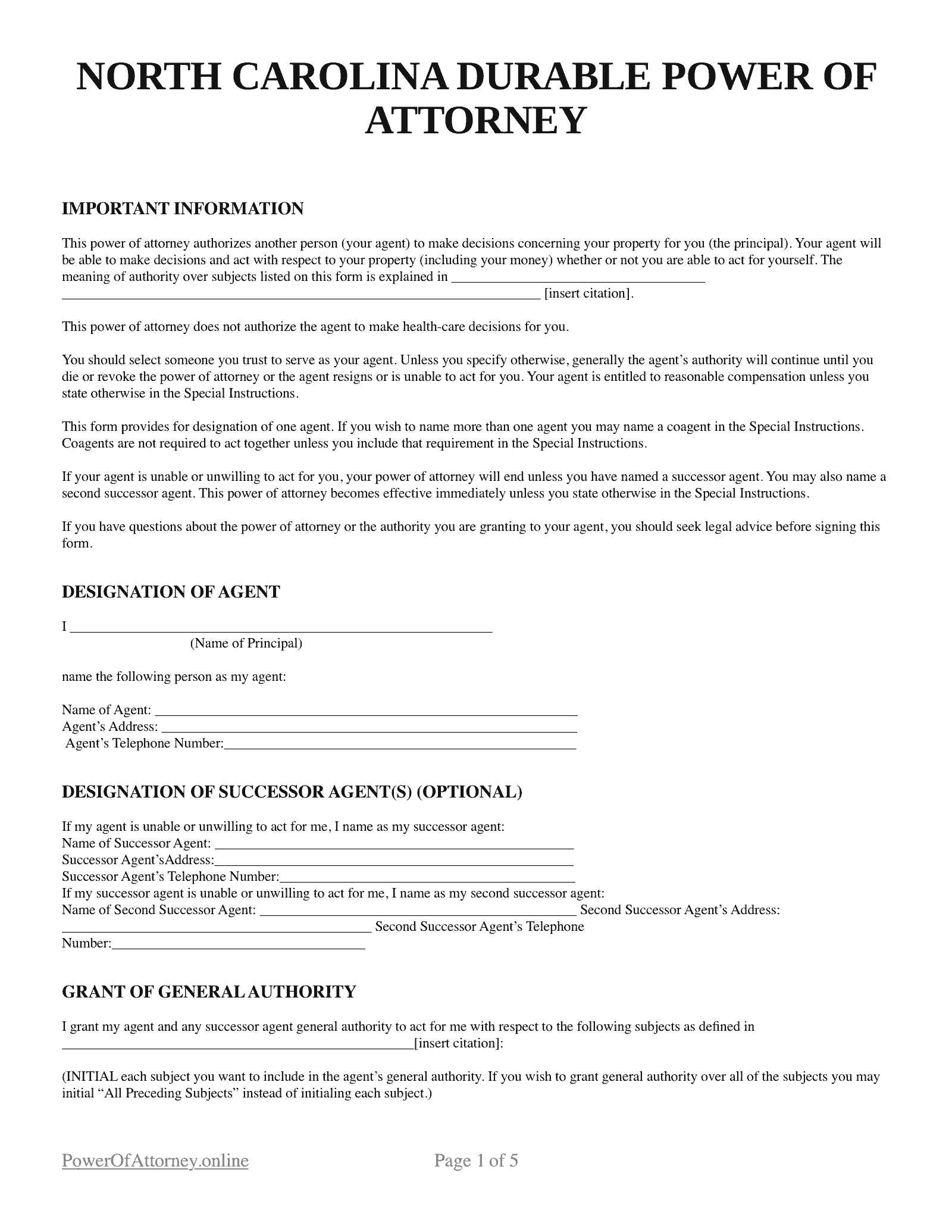Free North Carolina Power of Attorney Forms
A power of attorney (POA) is a document that gives authority to one person to make critical decisions on behalf of another. The authorized person is known as an agent, while the individual bestowing the power is called a principal. The agent can make general, financial, and healthcare decisions for the principal.
POAs are legally binding and most often used as a means of protecting the principal’s assets and best interests in case they become incapacitated or unable to sign important documents. Depending on the terms outlined in the POA, the agent’s responsibilities may be broad or limited.

North Carolina Power of Attorney By Type
There are several types of POAs, each serving a specific purpose. POAs are quite common among the elderly and chronically ill, who anticipate needing assistance in the near future, whether for financial or medical decisions.
Principals may make the POA durable so the document continues to be effective even when they become incapacitated.
Here are the types of POA:
- GeneralPOA - The agent is given blanket power over financial, healthcare, legal, and other business affairs. There are very few things an agent is not authorized to do, such as enter into a marriage on your behalf or change your will.
- Healthcare POA - This allows an agent to make medical decisions on the principal’s behalf, such as signing off on surgeries and treatment. In some cases, the agent can be responsible for making end-of-life decisions.
- Durable POA - Most POAs end when the principal becomes incompetent or no longer has the mental capacity to make decisions. A durable POA continues even when the principal becomes incapacitated. This distinction is important to prevent interruption of financial or medical affairs (North Carolina General Statutes § 32C-1-104).
- Limited POA - This is only for a specific responsibility outlined in the document. For example, you wish your agent to sign one contract on your behalf while you are out of the country. A limited POA defines the task and when it must be completed.
- Financial POA - This gives the agent permission to process financial transactions on your behalf. Some common duties include paying your bills, making bank deposits and withdrawals, selling or renting real estate, filing taxes, and managing retirement benefits, among others.
How to Get a Power of Attorney in North Carolina
You can download a printable template of a North Carolina POA. The form has spaces where you can specify various guidelines for the document.
In more complex cases, you can visit a local North Carolina law office to help you outline a POA. You can specify your needs, and a lawyer will create the document for you. This tends to be more expensive.
In all cases, the principal must sign the POA. If not, it must at least be signed with the principal’s consent. The signature is considered authentic when completed before a notary public in North Carolina.
North Carolina Power of Attorney Laws
The North Carolina General Statutes Chapter 32C, or the North Carolina Uniform Power of Attorney Act, enumerates the specific provisions of the law regarding POAs and defines legal terms.
The power becomes legal and executory when “signed by the principal or in the principal's conscious presence by another individual directed by the principal to sign the principal's name on the power of attorney and acknowledged”.
The law further states that “a signature on a power of attorney is presumed to be genuine if the principal acknowledges the signature before a notary public or other individual authorized by law to take acknowledgments. (North Carolina General Statutes § 32C-1-105)”.
The document becomes “effective when executed unless the principal provides in the power of attorney that it becomes effective at a future date or upon the occurrence of a future event or contingency”.
In the case of a future event, the principal “may authorize one or more persons to determine in a writing or other record that the event or contingency has occurred” (North Carolina General Statutes § 32C-1-109)
The law also outlines the situations where the POA can be terminated, including the death of the principal, revocation, the accomplishment of the purpose, and more (2018 North Carolina General Statutes § 32C-1-110).
FAQs About North Carolina Power of Attorney Forms
In general, most POAs have similar terms and characteristics. In the document, the authorized person acts on behalf of the principal for financial, healthcare, and other legal matters. However, some nuances differ from state to state.
Here are some common questions about North Carolina POA.